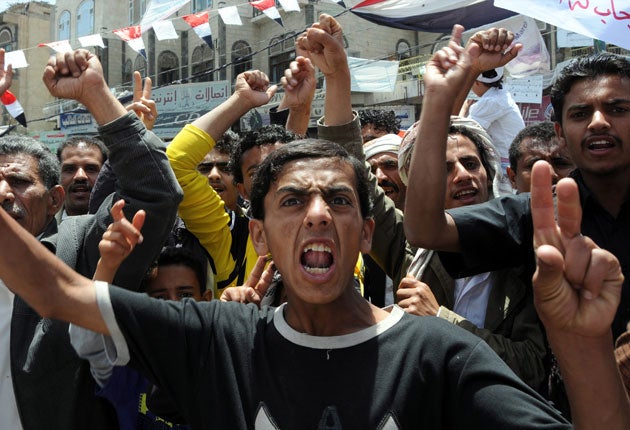Royal Marines prepare to land in Yemen to rescue civilians

Your support helps us to tell the story
From reproductive rights to climate change to Big Tech, The Independent is on the ground when the story is developing. Whether it's investigating the financials of Elon Musk's pro-Trump PAC or producing our latest documentary, 'The A Word', which shines a light on the American women fighting for reproductive rights, we know how important it is to parse out the facts from the messaging.
At such a critical moment in US history, we need reporters on the ground. Your donation allows us to keep sending journalists to speak to both sides of the story.
The Independent is trusted by Americans across the entire political spectrum. And unlike many other quality news outlets, we choose not to lock Americans out of our reporting and analysis with paywalls. We believe quality journalism should be available to everyone, paid for by those who can afford it.
Your support makes all the difference.A British naval contingent has been stationed off the coast of Yemen in readiness to extract UK nationals and citizens of allied nations amid fears that the country will descend further into chaos and violence following the departure of its beleaguered president.
Around 80 Royal Marines aboard the Fort Victoria will help provide a bridgehead if an evacuation becomes necessary, with another ship, Cardigan Bay, currently on its way to provide further support to the mission, according to naval sources.
The troops on board, from Alpha Company, 40 Commando, can be reinforced, if necessary by members of a Marine force currently taking part in an exercise in Albania. Defence officials in London stress there are no plans to do this at present.
The 31,000-tonne Fort Victoria and 17,000-tonne Cardigan Bay, both Royal Fleet Auxiliaries (RFAs) equipped with helicopters and landing crafts, are from an UK fleet in the Mediterranean tasked with organising contingency plans for rescuing Britons from both Syria and Yemen as well as conducting military operations in Libya.
It is difficult to ascertain, say British officials, the exact numbers of UK citizens in Yemen. Around 800 men, women and children, some of them dual-nationals, and many of Yemeni extraction, have registered with the British Embassy. Some of them, however, may have already left the country and some others are making their own way out.
As well as Britons, any evacuation is likely to involve those from the European Union and Commonwealth although other countries have also put their own evacuation plans in place and Saudi Arabia has indicated that it will provide help if necessary.
The military campaign against Muammar Gaddafi's forces continues to grow in tempo with the arrival of another Apache helicopter-gunship to join the four others which have carried out strikes from the aircraft carrier HMS Ocean in the last few days. The aircraft is being shipped to a Mediterranean island before being transported to the carrier.
However, away from the publicity focus, resources are being moved to the Indian Ocean by the UK's Response Force Task Group amid growing apprehension about the situation in the Yemen, where 400 people are reported to have been killed in the last week.
Sana'a airport remains open for the time being and charter planes can be used to bring out the stranded. Helicopters would be able to airlift people in case of the security situation deteriorating further.
However, an evacuation such as the one carried out from Libya in February following the uprising in the country, with military transport planes landing in a rural area, is viewed as being fraught with problems in the Yemen. The aircraft, say officials, will be vulnerable to extremist groups seeking Western targets.
The Yemeni president Ali Abdullah Saleh will be pressed by the Saudi government to agree to an agreement under which he would give up power in return for immunity from prosecution and assurances that his personal wealth would not be impounded.
It is believed that US officials will be meeting Mr Saleh, a long term ally against Islamist militancy, in the Saudi capital. At the same time American diplomats are meeting the Yemeni vice-president, Abd al-Rahman Mansur al-Hadi, in Sana'a. The acting leader, who is viewed as being more emollient about reforms, is also scheduled to meet representatives of other Western states, including the UK.
Although Western states are investing a lot of expectations in the vice-president, Mr al-Hadi, to bring about reconciliation, within Yemen he is regarded by many, including influential clan chiefs, as weak and lacking the power base to consolidate meaningful change.
Join our commenting forum
Join thought-provoking conversations, follow other Independent readers and see their replies
Comments